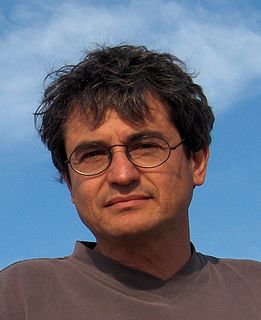A Quote by Stacey D'Erasmo
There are more clocks than ever - clocks on computers, on cell phones, on televisions, on any screen available, telling time to the digital second - but they all seem to matter less.
Related Quotes
Life would go out in a 'fraction of a second' (that was the phrase), but all night he had been realizing that time depends on clocks and the passage of light. There were no clocks and the light wouldn't change. Nobody really knew how long a second of pain could be. It might last a whole purgatory--or for ever.
The time would not pass. Somebody was playing with the clocks, and not only the electronic clocks but the wind-up kind too. The second hand on my watch would twitch once, and a year would pass, and then it would twitch again. There was nothing I could do about it. As an Earthling I had to believe whatever clocks said -and calendars.
Life evolved under conditions of light and darkness, light and then darkness. And so plants and animals developed their own internal clocks so that they would be ready for these changes in light. These are chemical clocks, and they're found in every known being that has two or more cells and in some that only have one cell.
The digital age is for me in many ways about temporal wounding. It's really messed up our ontological clocks. In the digital economy, everything is archived, catalogued, readily available, and yet nothing really endures. The links are digital encryptions that can and won't be located. That will have to be reassembled over time. It won't be exactly what it was. There will be some slightly altered version. So the book is both an immaterial and material artifact.
We never really see time. We see only clocks. If you say this object moves, what you really mean is that this object is here when the hand of your clock is here, and so on. We say we measure time with clocks, but we see only the hands of the clocks, not time itself. And the hands of a clock are a physical variable like any other. So in a sense we cheat because what we really observe are physical variables as a function of other physical variables, but we represent that as if everything is evolving in time.
When the first mechanical clocks were invented, marking off time in crisp, regular intervals, it must have surprised people to discover that time flowed outside their own mental and physiological processes. Body time flows at its own variable rate, oblivious to the most precise hydrogen master clocks in the laboratory. In fact, the human body contains its own exquisite time-pieces, all with their separate rhythms. There are the alpha waves in the brain; another clock is the heart. And all the while tick the mysterious, ruthless clocks that regulate aging.
Space has not changed but technology has, in many cases, improved dramatically. A good example is digital technology where today's cell phones are far more powerful than the computers on the Apollo Command Module and Lunar Module that we used to navigate to the moon and operate all the spacecraft control systems.





































